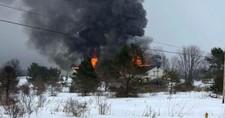

Mark Wahlberg and Jonathan Roumie Share the Importance of Prayer on The View

Tim Tebow: Young People Are Searching for Purpose that Can ‘Only Be Found’ in Jesus

Christian Schools with Strict Cell Phone Policies Report Better Student Mental Health: Study

Student Faces Potential Prison Time for Transphobic Post
Trending Articles
Recent News
Trending Articles
Recent News
Positive Stories
Celebrity
Video
Opinion
Church
Entertainment
Sports
Movies
Politics
Israel
Christian News Headlines - Breaking and Trending Religion News
Crosswalk Headlines - Christian news brought to you by a group of Christian writers and editors who are dedicated to creating a well-rounded look at what’s happening across the globe from a Christian worldview. Our vision is to inform and inspire productive discussion about the current events and online trends that shape our lives, our churches and our world.Crosswalk Headlines includes blog posts about current events and Christian media, breaking news, feature articles, and guest commentaries, many written by respected Christian thinkers.




























































